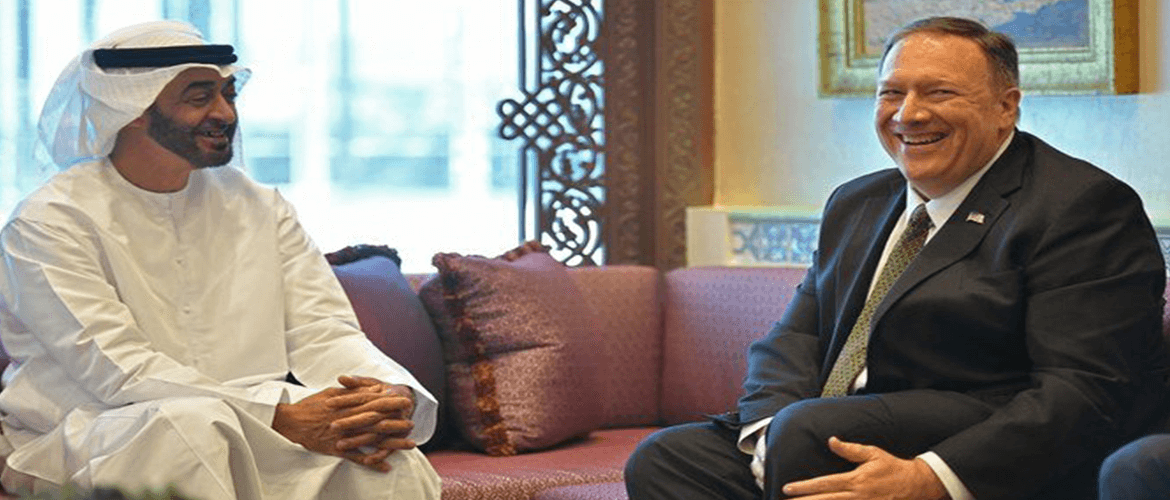Deal of the Century or an Election Gimmick
August 31, 2020 | Expert Insights

The August 13 Joint Statement by the U.S., United Arab Emirates, and Israel, was a defining moment in the evolving regional political architecture in West Asia.
However historic as this moment seems, it is important to look at the short and long-term strategies of the key players involved and the prospects of the deal making a difference in the volatile and dynamic Middle East.
THE DEAL
Conceptualised as part of the Trump administration's ‘Middle East Peace Plan’, the Abraham Accords have been publicised as the ‘Deal of the Century’. The UAE and Israel will develop ties in numerous areas such as trade and investment, security, tourism, technology, and energy, and will establish formal embassies in each other’s countries. Israel will, in turn, suspend its planned annexation of parts of Judea and Samaria (West Bank) and focus instead on expanding relations with other Arab and Muslim countries. The UAE has also sought to appeal to other Muslim countries and bring them over in favour of the deal while projecting this as a major ‘diplomatic feat’ in terms of the ‘Palestinian question’.
Israel has much to gain by this relationship as it gets access to newer markets for its growing technology sector and the inflow of ‘oil money’ to boost its industries. Although trade between Israel and its neighbours, Jordan and Egypt, has never boomed despite normalisation, it is expected to be different with the UAE — a major financial and business hub. Abu Dhabi, in attempting to project itself as a regional player, also stands to gain economic and other benefits from advanced Israeli business. This deal could lead to Saudi Arabia, and the GCC to follow its lead and formalise relations with Israel. Saudi Arabia has, so far, not reacted, but it is believed that it had a crucial albeit behind the scene role in the outlining of the deal.
However, misgivings continue to surround the Abraham Accords and their potential to further divide the Muslim world by creating sharply defined blocs within it. While Palestinians and the Hamas were the most vocal in their protest, Iran and Turkey also denounced it. The threat of annexation is a strong leverage for Israel to create a pressure point for Palestinians and other Arab countries. The deal has met with opposition within President Benjamin Netanyahu’s right-wing constituency as well.
EYE ON THE POLLS
Upcoming elections in both the U.S. and Israel are likely to have influenced the timing of the deal. It aims to enhance the flagging prospects of President Donald Trump’s bid in the November elections by gaining the full support of the Evangelical voter base. It also signals a major foreign policy triumph for Mr Netanyahu, currently battling corruption charges and indictment. Anticipating a less favourable Israeli policy if Democratic candidate Joe Biden were to win, Mr Netanyahu had every reason to push forward the deal. Thus, “the normalisation of relations with the UAE has given Israel a win just before a possible change of guard in the U.S., without any drastic change in its Palestinian policy,” says journalist Sumeet Kaul.
INDIA'S PERSPECTIVE
India welcomed the agreement and the full normalisation of Israel-UAE ties and endorsed the two-state solution — its default position —while exhorting both parties to work for a comprehensive peace deal. “India has consistently supported peace, stability and development in West Asia, which is its extended neighbourhood. In that context, we welcome the full normalisation of ties between the UAE and Israel. Both nations are key strategic partners of India,” said MEA spokesperson Anurag Srivastava. He added that India would continue its traditional support for the Palestinian cause and negotiations for a two-state solution.
Over the years, India has invested heavily in its security-oriented ties with Israel. Now with its key partners in the Middle East, like the UAE, also gradually normalising their relations with the pariah state of Isreal, makes it easier for India to strengthen its ties to key Arab states such as Saudi Arabia, the UAE, Qatar, Kuwait, Oman, and Bahrain, without Israel being the ‘elephant in the room.’
West Asia (and particularly countries in the Gulf) are home to nearly 8 million Indians. India has deeply vested interests in ensuring peace and stability in the region, as well as ensuring the continued flow of remittances into the country.
Foreign Policy Analyst C. Raja Mohan has always advocated the principles for India’s relations with West Asia as- supporting Arab sovereignty and efforts towards reconciliation; opposing foreign intervention in the region; supporting economic integration endeavours; and aligning India’s geopolitical interests with the moderate Arab Centre — Egypt, Jordan, the UAE, and Oman.
Assessments
- For India, the normalisation of ties between Israel, the UAE, and potentially the Gulf Arabs, opens up greater opportunities for engagement within the region and provides scope to strengthen economic relations and security and defence ties without getting entangled in the intra-regional web of conflicting interests.
- New Delhi must avoid getting drawn to any one side of the Middle Eastern polarisation. Iran is important to India, and must be engaged regardless of its isolation by the U.S. India must also seek new foreign policy approaches to engage with Turkey, while continuing to be vigilant of the growing China-Iran-Pakistan –nexus.








Comments